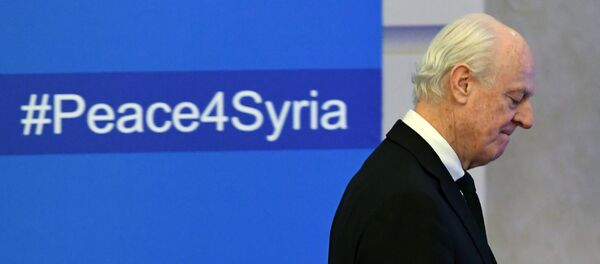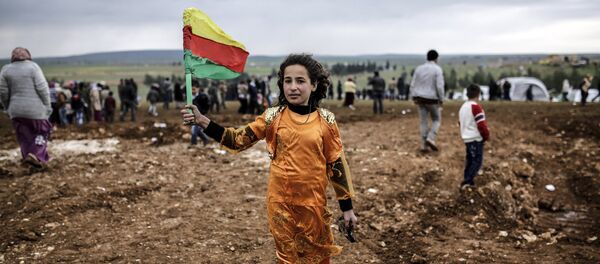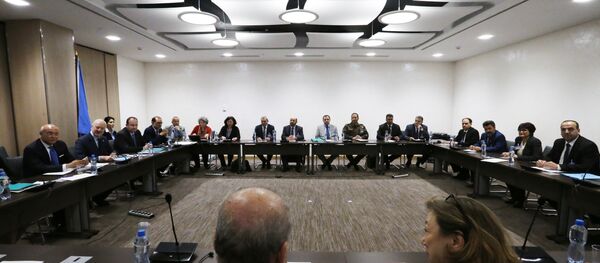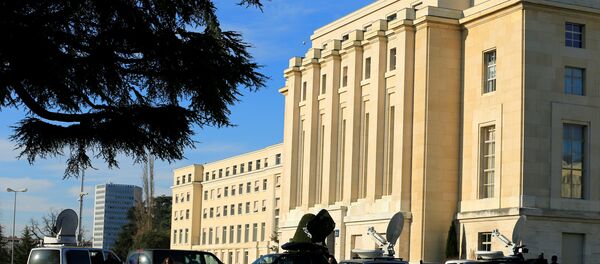The Geneva process on Syrian reconciliation started on January 29, 2016. The negotiations were held as indirect talks with UN Special Envoy for Syria Staffan de Mistura mediating contacts between various opposition groups in order to find common approaches to dialogue.
Several Syrian opposition groups were formed in the run-up to the first round of talks: the Riyadh group, the Moscow group, the Cairo group and the Astana group, all named after the places where they had been established.
The Riyadh group was created in December 2015 in the Saudi capital. Within the group, the National Coalition for Syrian Revolutionary and Opposition Forces is responsible for international relations. The Coalition's representative, Riad Hijab, headed the High Negotiations Committee (HNC). The main objectives on the group’s agenda are to establish a transitional government and remove Syrian President Bashar Assad from power. The Riyadh group positions itself as the leading opposition force, second to none in terms of its international legitimacy.
The Cairo group emerged in late 2015 after the adoption of the UNSC resolution calling for the intra-Syrian talks. The group is in close contact with the Kurdish People’s Protection Units (YPG), the military branch of the Democratic Union Party (PYD). The group was headed by Haytham Manna, head of the Syrian Democratic Council. At first, the group boycotted the talks, since two Kurdish parties from the Syrian Democratic Council were not invited to attend. The Cairo group later joined the talks as part of the Moscow group of the Syrian opposition (the Moscow-Cairo group). It is headed at the talks by Jihad Makdissi.
The Astana group was formed during talks in the Kazakh capital in May 2015 bringing together leaders and representatives of various Syrian opposition groups, as well as civil society and independent opposition activists. At the talks, the group joined the Moscow-Cairo moderate opposition group, and was represented by Randa Kassis, leader of the Syrian opposition Movement for the Pluralistic Society.
The government delegation was headed by Syria’s Permanent Representative to the United Nations Bashar Jaafari.
Five days into the first round of the January 29, 2016 talks on the Syrian settlement, little progress was achieved with the dialogue remaining on the preliminary stage. Putting together a delegation of the Syrian opposition turned out to be one of the key obstacles. The Syrian government said that it expected the opposition to present a list of its negotiators.
The fact that the Kurds were not able to take part in the Geneva talks was one of the key topics discussed at various meetings. The Russian Foreign Ministry argued that the Syrian issue can hardly be resolved without the Kurds, while Turkey firmly opposed any attempts to involve Kurds into the negotiating process.
The HNC continued to insist on Jaysh al-Islam and Ahrar al-Sham, both listed as terrorist groups and outlawed in Russia among other countries, taking part in the talks, since the HNC regarded these groups as moderate opposition.
On February 3, 2016, Hijab announced the suspension of the HNC’s participation in the talks until further progress is achieved. According to the HNC, it was the government delegation that caused the talks to break down. The Russian Foreign Ministry claimed that the HNC’s departure from Geneva was caused by the success achieved by the Syrian army in fighting terrorists near the northern Syrian city of Aleppo.
The intra-Syrian talks in Geneva fully resumed on March 14, 2016, with the arrival to Geneva of the government delegation, the HNC, representatives of the Moscow-Cairo group, as well as of an internal opposition group formed on March 15, 2016, by civil society opposition movements during a meeting at the Russian reconciliation center in Syria's Hmeimim. The Hmeimim group was headed by Ilian Masaad, the official representative of the Syrian National Workers’ Party.
The format did not change with Damascus and the opposition still refusing to talk to each other and maintaining dialogue through de Mistura’s mediation. For 10 days, de Mistura met concurrently with Damascus’ representatives and various opposition groups. On March 24, 2016, to sum up the round of talks, the envoy released a document highlighting 12 points of commonalities between the Syrian government and the opposition. All delegations were expected to share their points of view on the document with de Mistura in the run-up to the next round of talks.
On April 13, 2016, the third round of talks started in Geneva against the backdrop of a relative calm in Syria attributable to a ceasefire negotiated on February 27 under the facilitation of Russia and the United States.
During the April round, no progress was achieved in terms of starting direct talks between the opposition and Damascus or launching a dialogue on the political transition.
On April 18, the HNC announced its decision to suspend the talks due to the failure by other participants to abide by the UNSC resolution and the Geneva Communique. The HNC blamed the Syrian army for violating the ceasefire and shelling civilians. Jaafari called these accusations "provocative and irresponsible."
Despite the HNC’s withdrawal, de Mistura decided to continue the talks through April 27 with those who stayed in Geneva, namely the Syrian government, the Moscow-Cairo group and the Hmeymim group.
The next round of the talks was to take place in May 2016, but was postponed on a number of occasions.
The fourth round of Geneva negotiations took place on February 23 – March 3, 2017. The talks brought together the Cairo, Moscow and Riyadh groups, as well as armed opposition groups that had been involved in the Astana talks and joined the ceasefire agreement with the Syrian government.
The Syrian delegation did not change compared to the previous rounds, and was still headed by Jaafari.
The delegation of the HNC comprised of 21 representatives and was headed by Nasr Hariri, representative of the National Coalition for Syrian Revolutionary and Opposition Forces. Specifically, it included Jaysh al-Islam leader Mohammed Alloush and nine people representing armed groups of the Free Syrian Army. The Cairo platform headed by Makdissi and Jamil’s Moscow group participated separately, while the Hmeimim group was not invited to attend.
The talks started with the UN special envoy’s meeting with the delegations in a bilateral setting, followed by de Mistura’s welcome to the participants in the talks, which officially inaugurated the round. The delegations took their seats at the tables forming a semicircle, with the Government and opposition representatives seated in front of one another and de Mistura at the center. This format was partially inspired by the scheme used at the Astana talks to bring together representatives of the Syrian government and opposition delegations.
According to experts, the main achievement of the fourth round was a four-point agenda that was agreed upon. At the outset, de Mistura called on the parties to focus on three baskets of political issues: the constitution, the government and the elections. The government delegation, supported by Moscow, insisted on adding counter-terrorism efforts as the fourth item on the agenda. Uniting various opposition groups was one of the key issues at the talks.
On February 24, it was reported that the HNC and the Cairo group held a meeting in Geneva to discuss the possibility of uniting the Syrian opposition delegations at the talks. However, the sides were unable to reach an agreement.
On March 2, the Moscow group held its first face-to-face meeting with HNC representatives, agreeing to continue the dialogue on the possibility to form a single opposition delegation.
On the sidelines of the intra-Syrian talks, Russian Deputy Foreign Minister Gennady Gatilov met with the delegations of the Syrian government, the HNC, the Moscow and Cairo groups, as well as with independent opposition representatives.
During the fourth round, de Mistura presented to the delegations an unofficial document with 12 proposals regarding Syria’s future. The document was based on the proposals that had been put forward earlier by Damascus, and that could be amended in the future.
Geneva also hosted the fifth round of intra-Syrian talks on March 23-31.
Representatives of the Syrian Kurds refused to take part in the fifth round as part of the HNC delegations, arguing that the Kurdish issue was being ignored.
Experts close to the talks noted that the participants were unable to bring together their views on the key issues (governance, constitution, elections, counter-terrorism efforts) highlighted by de Mistura. The parties continued to insist on their own agendas, often ignoring the program proposed by the UN envoy.
The main positive outcome of the Geneva-5 talks was that the sides agreed to continue the discussions during the next round of talks.







